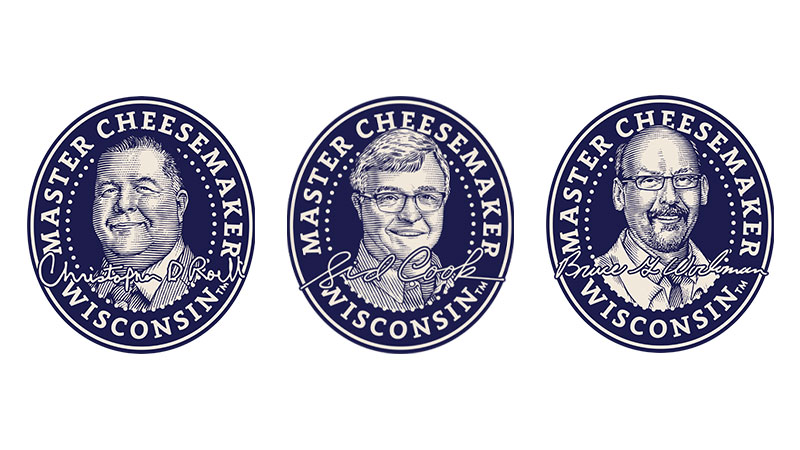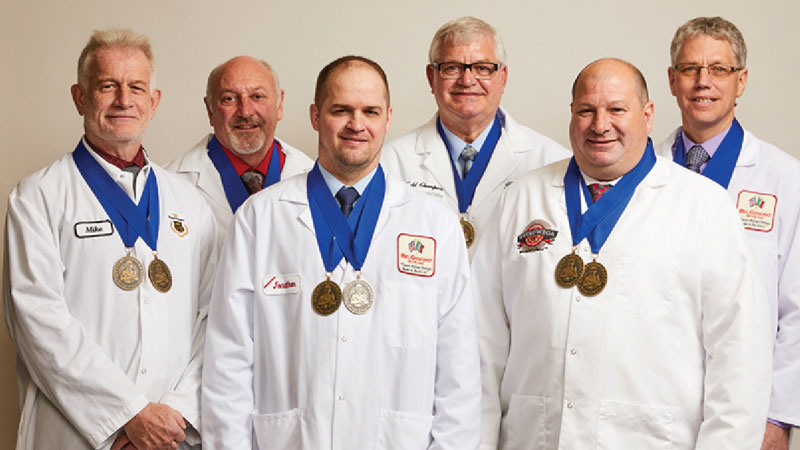The United States has legally existed since 1776. Roquefort, the iconic French blue cheese, has legally existed since 1411, when Charles VI granted a monopoly for its ripening to the people of Roquefort-sur-Soulzon, who had already been making the cheese for centuries.
It’s no wonder, then, that American cheese has a bit of an identity crisis. Both called out for its “bad reputation,” and recently awarded the best cheese in the world, which are we to believe? The answers are in the hands and mouths of Master Cheesemakers, an elite class of certified dairy professionals who are crafting some of the world’s best cheeses right here in the U.S., using their certification to embolden the American cheese category as a whole.
What is American cheese? While the floppy yellow slices may come to mind, the world of American cheese is vast and delicious. Thanks to trailblazing creameries through the 1980s and 1990s, including Wisconsin’s Uplands Creamery, Hook’s Cheese, and Emmi Roth, American cheese now means any cheese made in the U.S., much of which holds its own next to similar cheeses from countries with centuries-old cheesemaking traditions.
Don't Miss A Drop
Get the latest in beer, wine, and cocktail culture sent straight to your inbox.In the States, Wisconsin in particular is well known for its cheese achievements. This is thanks to waves of European immigrants who settled here in the 1830s and 1840s, many of whom almost immediately began replicating the cheeses of their homelands. Because of their efforts, Wisconsin has been a cheese hub since before it even became a state in 1848.
“Cheese,” The New York Times reported in 2006, “is the state’s history, its pride, its self-deprecating, sometimes goofy, cheesehead approach to life.” When it comes to standards for said cheese, however, Wisconsin is not at all goofing around. Wisconsin was the first U.S. state to establish cheese grading standards, and the first to require that cheesemakers be licensed. Since 1995, the state has won upwards of 5,500 cheese contest awards, winning more awards than any other state or country at the World Cheese Awards in 2018.
And, for the past 25 years, Wisconsin has been the only place outside Europe where cheesemakers can pursue a “Master Cheesemaker” certification.
Offered through the Wisconsin Center for Dairy Research, UW-Extension, and the Dairy Farmers of Wisconsin, to even begin to pursue this elite certification requires a cheesemaker be licensed for at least 10 years. They can seek certification in two cheeses each time they enroll in the three-year program and have to have made those cheeses for five years prior to starting that process.

Once accepted into the program, there is a “plant walk-through, basically an inspection with two members of the board that oversees the program,” says Chris Roelli of Roelli Cheese Haus. “At that same time, you are administered a verbal exam that consists of a number of questions to test your basic knowledge of cheese making.”
“This is really nerve-racking,” says Bruce Workman of Edelweiss Creamery.
It is only after passing that verbal exam and inspection that a cheese maker can start their course work, which must be completed within three years.
The purpose of all this hard work? Going through the work to attain this certification is “telling the consumer that this cheese was made by someone who really cares about the process of cheese making,” says Workman. Workman also happens to be the most decorated Wisconsin Master Cheesemaker, with 11 certifications so far; he’s aiming to have another certification for Bel Paese, a semi-soft Italian cheese, by April 2020.
For each year of the required three, “you must send in three samples of your cheeses … to be checked for analytical and micro and then judged,” says Workman. “They want to make sure that the cheeses you are going for will represent Wisconsin when placed into the market.”
What sort of cheeses can a Master Cheesemaker specialize in? Workman is currently certified in Gruyere, Raclette, Havarti, Butterkase, Brick, Muenster, Cheddar, Gouda, Baby Swiss, Specialty Swiss, and Emmental. Roelli is certified in Cheddar, Blue, and Alpine. Sid Cook of Carr Valley Cheese is certified in Cheddar, Fontina, Gran Canaria and Mobay. It’s not uncommon for a cheesemaker to go back for more certifications after the first go-around.

Is there an intense final exam for this intense certification? You betcha. “The final exam was crazy hard,” Workman remembers. “The first time I took it, I spent over 60 hours looking up information.” Clocking in at approximately 200 questions, half of which are essay questions, the open-book exam is “very intense,” Roelli admits. Though everyone gets three weeks to complete the exam, “most will take every bit of that, working three or four hours at a time every day,” he says.
It’s perhaps no surprise, then, that soon, cheeses made by these Master Cheesemakers will be branded with a “Master’s Mark,” featuring a small portrait of the master who made it. If anyone has earned it, they have.
“It’s a great and fruitful journey,” explains Cook, whose cheesemaking journey began at 3 years old when he would stir the corner of the cheese vat “so my dad didn’t have to.” Cook was first drawn to the certification as a way to dive into the science of cheese making.
“The master program unequivocally made me a better cheese maker,” says Roelli, who was drawn to the certification because “I wanted to be the best at what I do.”
“Probably the most important lesson I left with,” he reflects, “was to always pay attention to the details. I also learned how to problem solve and find answers to questions that pop up, using the vast amount of materials that you compile during the program.”
A less expected benefit of this certification? The community of other cheesemakers, “willing and usually able to help,” says Roelli. “There is such a wealth of experience amongst the other master cheese makers, that just being part of the network can help you.”
